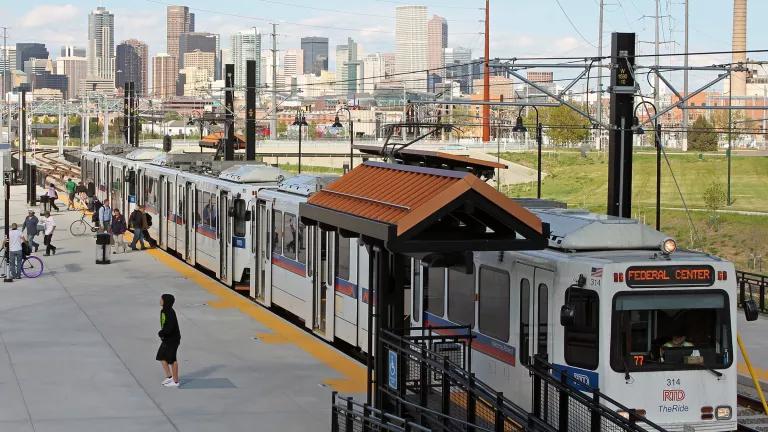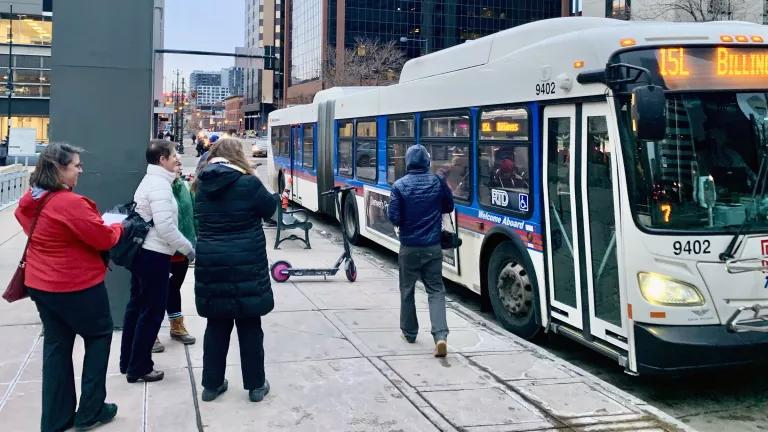Bill Passes to Power Up Colorado
Senate Bill 218 passes to ensure Colorado’s utilities meet growing customer demand for electric cars, trucks, homes, and appliances.

Jessica Russo, NRDC
Colorado’s electric utilities aren’t keeping up with their customers’ needs. Delays in connecting housing, solar panels, charging stations, and efficient appliances to the electrical grid are frustrating Colorado’s efforts to increase access to affordable housing, rebuild after climate-driven disasters, and meet its climate and air quality goals. But legislation is now headed to Governor Jared Polis’s desk that will help Colorado’s utilities and electrical workers rise to meet this challenge, as they have in the past.
Senate Bill (SB) 218 (sponsored by Senators Chris Hansen and Steve Fenberg and Representatives Monica Duran and Kyle Brown) modernizes Colorado’s grid planning to facilitate necessary infrastructure investment, promote a strong workforce, and ensure the state’s largest utility, Xcel Energy, meets its obligation to serve its customers in a timely manner that is consistent with the state’s other goals and regulations. The bill:
- Holds Xcel to transparent deadlines to provide electricity and interconnection to the grid to ensure the utility meets customer needs in a timely manner.
- Creates a fairer cost allocation mechanism to ensure one unlucky solar customer does not have to pay the entire cost of a grid upgrade that benefits everyone.
- Directs Xcel to address a backlog of customer requests by providing a regulatory path to make much-needed grid upgrades over the next 18 months, subject to Public Utility Commission (PUC) oversight and binding cost caps.
- Allows the utility to advance-order needed equipment, like transformers and switchgear, mitigating supply chain delays and reducing costs by ordering proactively in bulk rather than in a reactive, piecemeal fashion.
- Provides grant funding to train electrical workers and directs utilities to ensure that Colorado has a qualified and adequate workforce to build the grid it needs to meet its goals.
- Aligns Colorado’s long-term Distribution System Planning process with federal, state, regional, and local climate and air quality laws and regulations: It requires Xcel to propose five-year budgets consistent with those laws and regulations, and it requires the PUC to review those proposals to ensure they are consistent with those standards and incorporate potentially less costly solutions like load management and non-wires alternatives whenever possible.
- Ties utility cost recovery to performance metrics, such as how long it takes the utility to interconnect solar systems and provide energy to electric vehicle (EV) charging stations. This appropriately aligns financial incentives with the utility’s obligation to serve its customers and the achievement of Colorado’s climate and air quality goals, laws, and regulations.
- Creates a virtual power plant program to support deployment of flexible grid technologies like battery storage. This can help bring down costs for all customers and avoid unnecessary investments in alternative generation, transmission, and distribution resources.
Now you might think this bill will raise rates, but SB 218 does not require utilities to incur and recover costs they are not already obligated to incur—it merely ensures the investments that the utilities will make regardless (per their existing “obligation to serve”) will be made in a time frame that is consistent with Colorado’s existing laws, regulations, and standards. Of course, meeting that obligation to serve requires investments in the grid, but you need to look at both sides of the ledger—costs and benefits.
M.J. Bradley & Associates analyzed the costs and benefits associated with widespread EV adoption in Colorado and concluded it would yield $29 billion in fuel cost savings, create $10 billion in emissions benefits, and reduce utility bills in Colorado by $4.1 billion by bringing in new revenue in excess of associated costs, reducing the price per kilowatt-hour by spreading the costs of maintaining the grid over more kilowatt-hours. That helps everyone, regardless of whether they drive an EV.
This phenomenon has already been observed in the real world, in Colorado. Synapse Energy Economics has documented that, between 2011 and 2021, EV customers in Colorado contributed $26.7 million in excess of the cost of serving the EV load. That money was returned to all utility customers in the form of rates that are lower than they otherwise would have been (a countervailing factor to others pushing rates up).
And requiring utilities to rightsize and future-proof grid investments, as this bill does, will yield additional cost savings for the body of utility customers. For example, real-world data shows total costs can be halved if the utility builds one 8-megawatt substation sized to accommodate future truck charging demand instead of making multiple, incremental upgrades. The bill also requires the utilities and the PUC to avoid grid upgrades whenever it is less costly to invest in load management and non-wires alternatives.
SB 218 will help Coloradans by putting downward pressure on electric rates, putting steel into the ground, creating good jobs, cleaning the air, and freeing consumers from the volatility of the global oil market.



